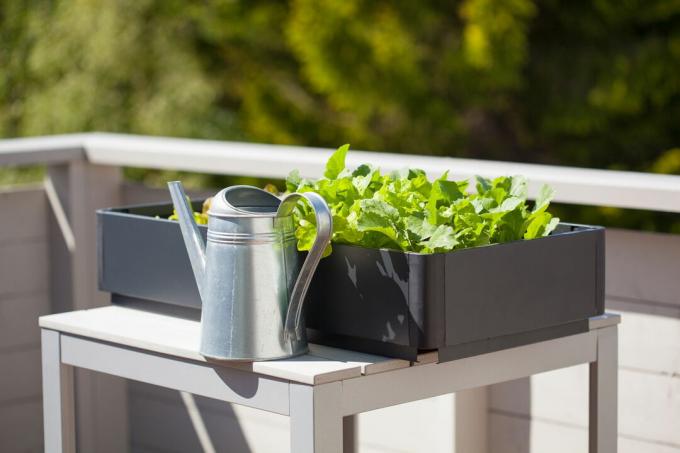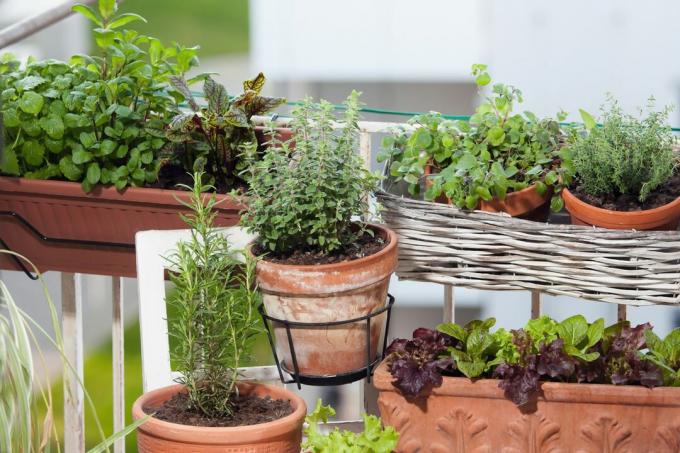Growing vegetables on the balcony is anything but difficult, even if there is little space. We will show you which plant suits your balcony.

Those who don't have a garden but still want to garden often switch to the balcony. Fortunately, harvesting a lot of vegetables is not a problem here either. Most Vegetables can also be grown in pots without any problems. However, beginners in particular find it difficult to start gardening on the balcony: The question of which plants can thrive on your balcony in particular unsettles many. We will show you the factors on which successful vegetable cultivation depends and which plant goes with which balcony.
Even in the city it is possible to grow a lot of delicious vegetables yourself. Of course, self-sufficient nutrition will be difficult even on the largest balcony. With our tips on growing vegetables in a small space, you can make the most of your space.
contents
- Criteria for suitable plants for the self-sufficient balcony
-
Suitable plants for balconies with every direction
- Plant overview for the cardinal points
- Plants for the self-sufficient balcony with different expenditure of time
Criteria for suitable plants for the self-sufficient balcony
Not every plant can be grown equally well on every balcony - but before you waste a lot of time and money on it Finding out which plant is most suitable for your balcony can help you make the selection based on two simple criteria enclose. On the one hand, you should determine in which direction your balcony is facing, and on the other hand, you should ask yourself how much time you would like to invest in gardening. Once these questions have been clarified, the selection is clearly narrowed down
Suitable plants for balconies with every direction
While the direction of the compass usually plays a subordinate role in the garden, it is elementary for gardening on the balcony. The reason: The direction in which the balcony is oriented almost always determines the amount of light that arrives at the balcony. A north-facing balcony is almost always in the shadow of the building, while it is almost always sunny on the south-facing balcony. East and west balconies, on the other hand, are in the middle and offer both sun and shade. Since different types of vegetables also differ fundamentally in terms of their demand for light, the choice of vegetable type is directly dependent on the amount of light and thus also on the orientation of the balcony. Since the east and west balconies have both sunny and shady spots, many types of vegetables can be grown here: broccoli and Kohlrabi, Salads of all kinds, Carrots and radish, Beans and a multitude of herbs are just a selection of plants that are very comfortable on east and west balconies. Basically all plants that appreciate sunny or partially shaded locations thrive here.

The south-facing balcony, on the other hand, is suitable for all sun worshipers: varieties that cannot get enough sun feel particularly at home here - this includes, among other things tomatoes, paprika, Cucumber, Berry and Eggplant. But the plants on the east or west balcony can also feel comfortable here if you provide them with some shade with a sun sail or something similar. Thus, the south-facing balcony is perfect for most types of vegetables and ideal for gardening. Owners of a north-facing balcony have the hardest time: Growing plants is generally more difficult on their balcony, as there is little light available. That is why for this balcony above all Vegetables that can also grow well in the shade suitable. This includes almost all types of cabbage, Swiss chard, Lamb's lettuce, Beetroot or leek.
Plant overview for the cardinal points
Not sure which plant is suitable for your balcony? Here we have put together a brief overview of the various types of balconies and the plants that go with them.
East or west balcony:
- All plants that like it sunny or partial shade
- Salads
- Herbs
- radish
- Kohlrabi
- broccoli
- Beans
South balcony:
- All plants that like particularly warm, full sun locations
- tomatoes
- paprika and chili
- cucumber
- Mediterranean herbs
- Berries like Strawberries, Currants or Raspberries
- aubergine
- If there is sufficient shade from awnings or the like, all types of vegetables that are also on the east or Flourish west balcony

North balcony:
- Only vegetables that are particularly robust and can grow in the shade
- All Cabbage varieties
- Swiss chard
- Herbs like dill, tarragon, chives and Caraway seed
- Salads like Lamb's lettuce, arugula or winter purslane
- Beetroot
- Poree
Tip: Because hardly any energy in the form of sun rays arrives on the north side of the building, vegetables are opened the north balcony always grow much slower and deliver lower yields than comparable ones Plants. It is all the more important to start growing in good time, to use cold frames and to replace the plants with the right ones Earth and to support an optimal supply of nutrients. In this way you can bring large and strong plants to the balcony as soon as it gets warm and make optimal use of the growing season.
Plants for the self-sufficient balcony with different expenditure of time
But not only the direction of the compass determines the success of the self-catering balcony: The time required also plays a major role in the growth of the plant. With daily care, some plants can thrive on a balcony that is not the ideal one Requirements promises, while other plants start to grow despite a suitable balcony but without care wither away. If you don't have the time (or don't feel like it) to look after your garden every day, you should therefore rather Reach more robust instead of demanding varieties - these forgive even a spontaneous weekend trip without Problems.

Most of them are considered robust vegetables Types of cabbage, French beans, Mediterranean Herbs, Pick salad, arugula and also spinach and radish. And also Beetroot, Onions and Jerusalem artichoke you can safely leave it to yourself. But the individual varieties of a certain vegetable can also differ greatly from one another. So there are often more robust breeds that bring a little less yield, but forgive one or the other mistake. If you don't want to spend too much time in your garden, you should consider this when buying plants.



